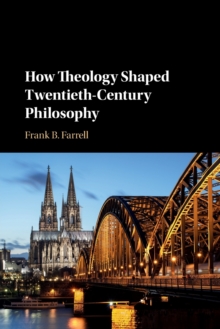Description
| Product ID: | 9781108740630 |
| Product Form: | Paperback / softback |
| Country of Manufacture: | GB |
| Title: | How Theology Shaped Twentieth-Century Philosophy |
| Authors: | Author: Frank B. Farrell |
| Page Count: | 274 |
| Subjects: | Philosophical traditions and schools of thought, History of Western philosophy, Christianity, Judaism, Christian theology, Judaism: theology |
| Description: | Select Guide Rating Medieval theological ideas had an important influence on later philosophy. This book explores the legacy of these ideas and shows how key figures including Carnap, Russell, Quine, Hegel, Derrida, Benjamin, and McDowell were influenced by them yet also sought to escape from them. Medieval theology had an important influence on later philosophy which is visible in the empiricisms of Russell, Carnap, and Quine. Other thinkers, including McDowell, Kripke, and Dennett, show how we can overcome the distorting effects of that theological ecosystem on our accounts of the nature of reality and our relationship to it. In a different philosophical tradition, Hegel uses a secularized version of Christianity to argue for a kind of human knowledge that overcomes the influences of late-medieval voluntarism, and some twentieth-century thinkers, including Benjamin and Derrida, instead defend a Jewish-influenced notion of the religious sublime. Frank B. Farrell analyzes and connects philosophers of different eras and traditions to show that modern philosophy has developed its practices on a terrain marked out by earlier theological and religious ideas, and considers how different philosophers have both embraced, and tried to escape from, those deep-seated patterns of thought. |
| Imprint Name: | Cambridge University Press |
| Publisher Name: | Cambridge University Press |
| Country of Publication: | GB |
| Publishing Date: | 2021-04-08 |


